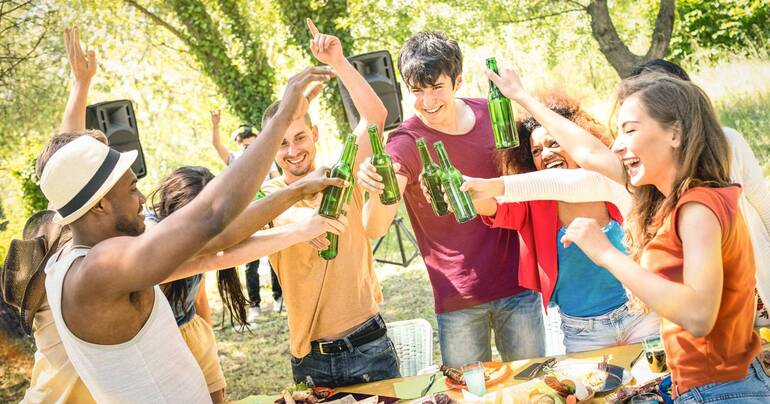Start 14-Day Trial Subscription
*No credit card required

How to Party Safely With Alcohol For Students
When partying with alcohol, it is important to keep track of the drinks you consume. Use a drink counter or other counting device to keep track of your intake.
Keeping track of the amount of alcohol you drink can prevent accidents and make sure you're staying in control of your alcohol consumption. Also, by thinking in advance not only about the amount of alcohol, but also about student tasks, you can rest easy. And don't worry about needing a finished dissertation the day after the party just order it in advance here https://essaywritinghelp.pro/dissertation-writing-services/. Be sure to discuss safety plans with your friends, too. It's also important to avoid drinking games. If you're unsure of the rules of a party, consider consulting an adult.
Keep track of your drinks
When partying with alcohol, it is important to keep track of the drinks you consume. Use a drink counter or other counting device to keep track of your intake. It is also a good idea to limit the type of alcohol you consume. Alcohol consumption can lead to impaired judgment, and you may be less careful when you are in a drunken state. Having a designated driver can also help you keep track of your drinks.
It is also important to know the standard serving size of alcohol. A standard drink contains about 0.6 fluid ounces or 14 grams of pure alcohol. For example, a large glass of wine or beer may have more alcohol than a standard drink. Also, the percentage of pure alcohol varies from drink to drink.
It is never a good idea to drink alcohol for students if you do not need it. Whether you drink to forget your troubles or to feel comfortable, it is never a good idea to overdo it. Remember that our mindsets determine our actions and when we drink alcohol, this will only increase the riskiness of our decisions.
During the social scene at college, it is important to have a buddy system and communicate the importance of keeping an eye on friends. If a party is hidden or unnoticed, talk about how to navigate these situations. Also, never leave a drink unattended, nor accept it from someone unfamiliar. In addition, you must never purposefully overdo your alcohol intake.
Create safety plans
Alcohol misuse can have a serious impact on a college student's life. Luckily, there are many ways for parents and college officials to prevent their children from getting involved in this behavior. By creating alcohol safety plans for students, they can help minimize the negative effects alcohol can have on a student's health.
First, make sure every student in a car wears a seatbelt. This simple act saves about 15,000 lives every year. Also, make sure no one is sitting on the dashboard, which can become a launch pad in a crash. Loose items also pose a risk, so make sure they are placed in the trunk or the floor. This will protect your student from injuries during a crash.
Avoid drinking games
Students who drink alcohol often attend parties. They think that a few drinks will make them feel better, but the truth is that alcohol reduces the mood. Students should be aware that it is normal to be stressed and sad, and they should find alternatives to drinking. Exercise is an excellent alternative, since it helps regulate mood.
Drinking games often involve pre-gaming, or drinking alcohol prior to a social gathering. These events are associated with higher BALs, which can have negative consequences later in the night. Research has linked these events with hospitalizations, regrettable sex, driving under the influence, blacking out, and passing out.
Drinking games can also cause tension. One good game is the International Drinking Rules, wherein each player must hold his or her glass in hand. This game is a good compromise for large groups. Another good game for pre-drinking is the Task Master, which involves a game of rock, paper, scissors. The first person to answer the question correctly wins!
While drinking games can sometimes be unavoidable, they should reflect moderation and caution. For example, do not play drinking games that involve shots, as these can lead to alcohol impairment. Aiming to model good behavior, good hosts try to limit the amount of alcohol they serve and encourage students to limit their intake. Moreover, they try to limit the number of intoxicated guests.
Talk to your friends about alcohol
If you're a parent of a student, it's important to talk to your child about alcohol while partying. Many students turn to alcohol as a way to feel better or deal with stress. However, that approach is never healthy and can lead to a variety of dangerous consequences. Students should consider the following alternatives to alcohol: sports, volunteer work, hobbies, music, dance, and games. They can also join school clubs and volunteer to help the community. Those activities can give them a sense of pride and accomplishment.
Drinking alcohol too much can lead to blackouts and other serious problems. Students who drink too much may miss class or not remember what they did, while others may end up in trouble with campus police. They may also lose friends. Furthermore, alcohol use may also result in mood swings, irregular sleep patterns, and jitteriness, which can affect a student's ability to focus and get through classes.
Alcohol use is a serious health risk for students, and the dangers of alcohol use in particular are too many to count. There are several consequences to excessive alcohol use, including unintended injuries, violent behavior, and even criminal behavior. In addition, heavy drinkers are at risk for developing alcohol-related problems, including sexual assault. Moreover, they may end up choking or vomiting, resulting in serious medical conditions.
Alcohol use can also lead to car accidents for students who are under legal drinking age. To avoid such situations, make sure that you and your friends have a designated driver to take you home safely.
Be aware of underage drinking
Underage drinking is a serious problem that can affect the mental health and wellbeing of young people. The negative effects of drinking can range from mood swings to anxiety and suicidal thoughts. It can also lead to increased risk-taking behavior such as driving under the influence and unprotected sex. Teens may even skip school or fight with other students.
The most common cause of underage drinking is peer pressure. Teens are more likely to imitate their peers' behavior if they think it's cool. However, teens are also influenced by peer pressure, and it's important to make sure that your teenagers don't feel pressured to drink at parties.
Underage drinking can also lead to a variety of legal issues, including assault. It can also interfere with schoolwork and make it difficult to focus on future plans. Ultimately, poor academic performance can affect the child's chances of gaining admission to college and even their employment prospects. Further, legal issues related to alcohol abuse can cause serious financial and social consequences. In addition, underage drinking can lead to physical altercations and even sexual assault.
It's vital to stay informed about the current statistics regarding underage drinking. It's also important to get to know the children's friends before allowing them to invite underage friends to a party. Parents should make sure that they clearly communicate their stance on underage drinking and the consequences for supplying alcohol to minors.
Educating teenagers on the dangers of underage drinking is crucial. Teenagers want to have fun and socialize, but they should understand the consequences of underage drinking. It's also important to make sure they know that they can call for help if they feel unsafe or in an unsafe situation. However, never punish your child for calling for help.



